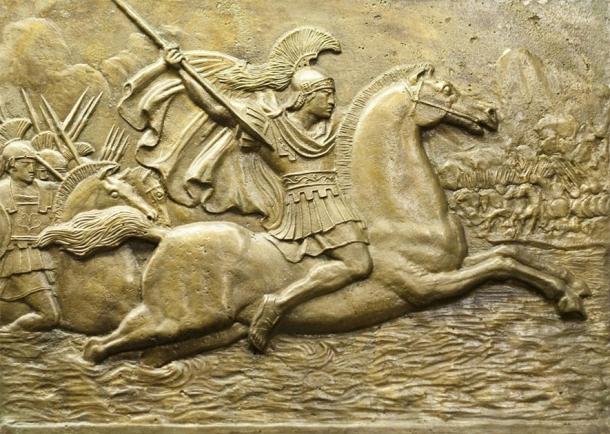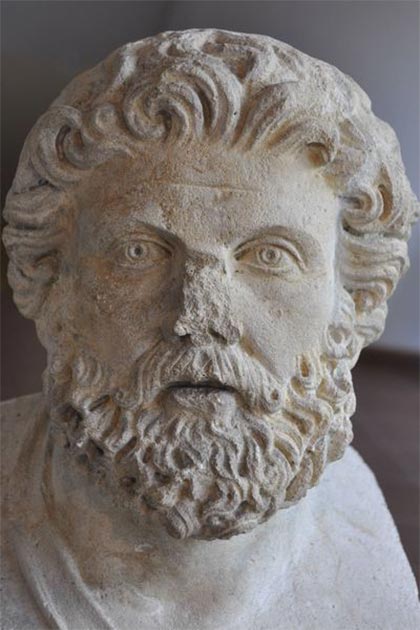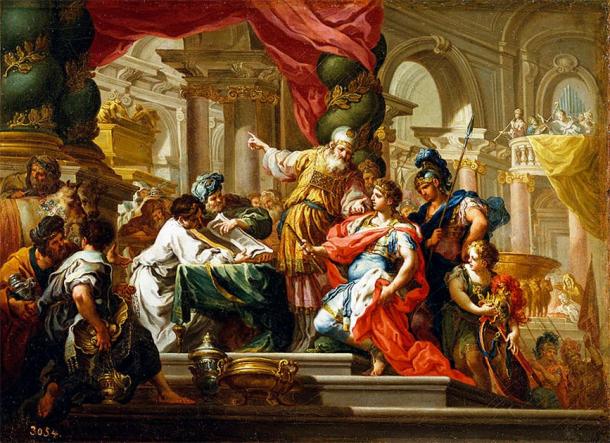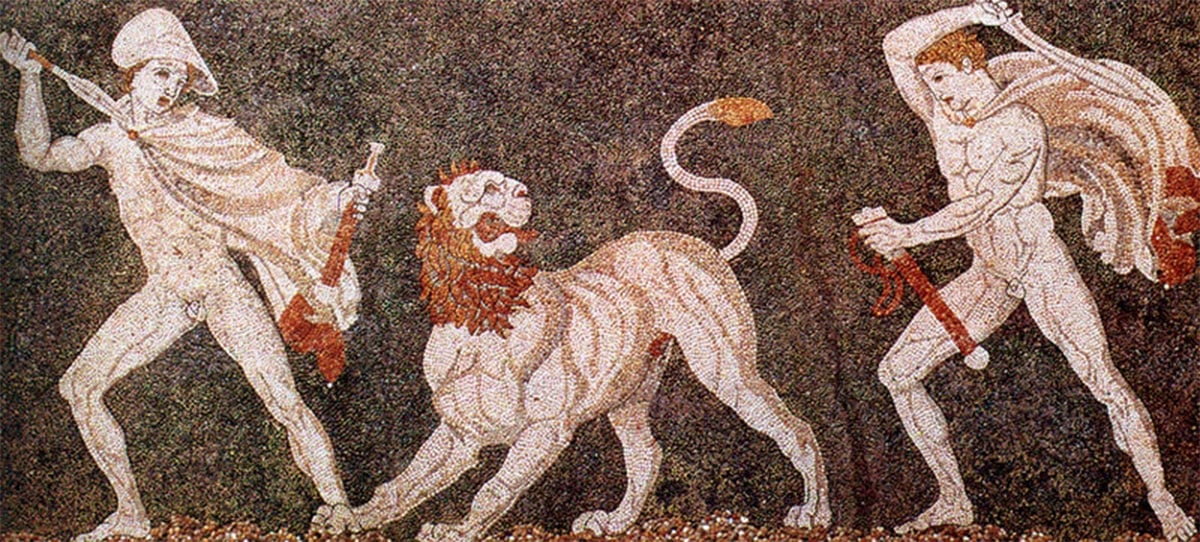Alexander the Great: God of Youth and Ambition?
Alexander III of Macedon, better known as Alexander the Great (356-323 BC), was a Macedonian king who ruled over an expansive empire that reached from Greece to the Gandharan regions of Pakistan. Alexander life is a fascinating story of a man who became a god.
He was tutored by Aristotle, from whom he learned much about philosophy as well as ancient Greek myths. This was probably where he derived his desires to bring civilization to what was considered Asia. This one desire was also what drove him farther than most had previously attempted, bringing further insight into what the West knew nothing of, as well as opening new trade through an area that would later be associated with the Silk Road.
Actions and Reactions Driven by Ego
Though the accounts written about him spoke of an intelligent, compassionate, strategic, and respectfully superstitious young man; he was also sometimes irrational, paranoid, and alienating. Alexander's attempts were purely driven by ego. However, this same drive inspired his armies to partake in his vision of bringing Greek culture to the east.

Alexander the Great battle relief. (Image: Brigida Soriano / Adobe Stock)
His addiction to conquest made him absent from his throne and inevitably drove him to his death at the age of 32. His legacy as a “Great King” only lasted 12 years. Alexander never left plans of who would succeed in his empire because he never imagined dying.
Alexander the Great’s dreams were to become an immortal god with worshippers all around the known world. This was why shortly after his death, with no heir left behind, his newly conquered empire demised into political chaos. His most loyal Macedonian Generals, who spent years fighting side by side, digressed into petty warlords hoping to carve up his newly acquired empire.
- How Some Naked Monks of India Fascinated Alexander the Great
- The Influential Women that Surrounded and Aided Alexander the Great
They became vicious warring kingdoms struggling for relevance in a world without its king. Yet, even with the anarchy that followed his death, these same generals still made sure to respectfully ask Alexander’s spirit for his guidance and wisdom whenever they planned battles against each other.
How could a young man who died at 32 command such respect? How was it that Alexander's ambitions, the complexity of his character, and the mythic vision surrounding him live on for well over 2000 years? Was Alexander the Great a god on Earth?
Brief History and Early Life of Alexander the Great
It was said by the famed Greek historian Diorodus of Sicily that Alexander’s father’s side could be traced as direct descendants of Herakles. The lineage of his mother, Olympias of Epirus, could also allegedly be traced to the line of the Aeacus through Neoptolemus, having him contain ‘the physical and moral qualities of greatness.’
Additionally, Plutarch also mentioned that Philip had dreams of placing a pearl of thunder within his wife’s womb resulting in her birthing a lion. This was a dream which Plutarch also stated to be the prophecy made by the mother of Pericles upon his birth.
Though Alexander was admired as a conqueror and an ambitious man, these traits were not necessarily his own. His father Philip II of Macedon (382-336 BC) was just as ambitious, if not more; for his goal was to ascertain that his Macedonian Argead Dynasty grew in wealth and power and that this continued for generations to come. Philip II achieved plenty in his lifetime.
His efforts to create the league of Corinth were essential in his seizure of power and dominance over the Greek City-states. His ambition moving forwards was to invade and conquer Persia. However, he would never succeed in this task, for during a celebration for the marriage of his daughter Cleopatra of Macedon to a distant relative named Alexander I of Epirus, Philip was assassinated in 336 BC by his bodyguard Pausanis.

Philip II statue 350-400 AD. (CC0)
Young Alexander was also thought a possible collaborator since his ascension to the throne seemed all too convenient. Given his devotion to the burial and funeral ceremonies for his father, as well as his quick pursuit of killing Attalus who had slighted Alexander through his actions in previous encounters; and in executing his infant half-brother Caranus, who had been born just five days before Phillip's assassination; Alexander soon proved himself to be a competent and honorable leader acting in both a brutal, but highly expected manor, of anyone in his position.
Alexander was able to assemble the Greeks and unite them under Philip's original plans for his campaign against Persia. The only group that stood against Alexander was the Lacedaemonians, who, as Arrian stated in his writings, were forbidden by Spartan customs to follow a foreign commander into battle. However, the immense support Alexander gained with the promise of taking the Persian Empire allowed him free authority over his allies' armies.
Conquest of the Persian Empire and Movements into Asia
Though Alexander’s political motions were apt, and his campaigns to gain support had proven successful, he was still grounded in his firm beliefs of the myths and faiths of the gods of each land. His personal superstitions were just as present in his actions as his military might, his influence, and his strategic intellect.

‘Alexander the Great in the Temple of Jerusalem.’ (Public Domain)
According to Plutarch, for Alexander to confidently cross into Asia, he had to first stop at Ilium to sacrifice animals to Athena and pour libations to the heroes. As a sign of respect for the ancient deities, he visited the alleged gravestone of Achilles and anointed it with oil. He worshiped Achilles and fashioned his own shield in the style of the Trojans. The respect given to these gods, especially as he entered Asia, was significantly crucial to his conscience. And in Alexander's mind, it would seem to provide luck in his campaigns throughout his life.
In 334 BC, Alexander crossed the Hellespont into Asia minor. He was accompanied by 48,000 allied and Macedonian hoplites, 6,000 cavalries, and a fleet consisting of 120 warships. In the following weeks, during the Battle of Granicus (modern-day western Turkey), Alexander defeated a Persian army composed of 40,000 units.
Half of these units were horsemen, while the other half was an arrangement of various soldiers. This victory resulted in Alexander being able to advance over the western coast and crippling the Persian Naval ports along the way. His campaign continued as he crossed into Taurus.
- Battle of Gaugamela: Alexander the Great Thrashes the Achaemenids
- Alexander the Great: Was he a Unifier or a Subjugator?
In another instance of superstition and myth, it was said that in 333 BC Alexander entered the Phrygian, the capital of Gordium, after subduing their army. He then approached a relic that revealed itself to be an old wagon wheel with its yoke tied in a complicated network of knotted ropes fashioned from the thin bark strips of the Cornell tree. The locals told Alexander that it belonged to Gordius, the father of King Midas.
According to Arrian, the traditional belief of the knotted Gordian wagon was that anyone who loosened the ropes from the wheel was destined to conquer all of Asia. Given Alexander's respect for traditions and love of myths, he took it upon himself to try and solve this mystery.
Though the famed story that is remembered by most is that Alexander drew his sword and cut it loose, there is another version which is mentioned by both Arrian as well as Aristobulus. In this version, Alexander wasted no time trying to find the beginning of the ropes, but instead looked for the ‘hestor’, or pin, of the wagon pole, which dislodged the yoke and released the knots instantaneously. In both accounts, Alexander solved it.

Illustration of Alexander the Great cutting the Gordian Knot. (Tony Baggett /Adobe Stock)
However, Astribulus's version places Alexander as more cunning than brutish. Regardless of the truth, his confidence in conquering the rest of Asia was now present in himself as well as in the minds of his followers. But he could have never guessed that these mythic self-inflicted tests and lesser victories were going to come at a price later on.
By 333 BC in the battle of Issus near modern-day Syria, Alexander faced Darius III, ruler of the Achaemenid Empire. Though Darius III’s army was significantly larger, Alexander was still able to defeat him. However, Darius III escaped from capture, leaving his empire open for Alexander, but not officially conquered.
Given that Darius III was in hiding, he had left his wife, two daughters, his mother Sisygambis, and his treasures vulnerable for the taking. Darius III sent envoys to negotiate peace, offering 10,000 talents for his family's safety and return to him, as well as full ownership of vast amounts of land.
Alexander ignored the envoys, but maintained courtesy to Darius's family and brought no harm to them while they remained his hostages. Alexander then continued his campaign conquering Syria, the Levantine coast in 332 BC, and finally Tyre. He then moved to take Egypt, where he was accepted with open arms as a savior.
Alexander the Great, God-King
There he was praised as a god. He was pronounced the son of Amun at the Oracle of Siwa Oasis in the Lybian Desert. With such blessing and the honor of being considered among the ancient gods, Alexander reveled in the title of being the son of Zeus-Ammon.
By 331 BC, he continued his campaign and moved into Northern Iraq in pursuit of Darius III and found his army at the Battle of Gaugamela. Once again, his army lost, and Darius III retreated to the mountains of Ecbatana, leaving Babylon open for Alexander to take.

The battle of Issus between Alexander and Darius of Persia. Floor mosaic, Roman copy after a Hellenistic original by Philoxenos of Eretria. (Public Domain)
It was then, after he had conquered most of the Persian cities, that Alexander realized he had succeeded far more than what his father Philip II had initially dreamed. However, whether it was the curse for retribution bought forth by his luck or whether he himself grew careless through his glories in battle, Alexander had begun to experience betrayal and tragedy.
A Change of Luck
From Babylon, to Susa, and then to Persepolis, each city in the Persian empire slowly collapsed and gave in to the might of Alexander the Great. Each fallen city presented Persian gold and loot that almost seemed endless. However, during Alexander's five-month stay at Persepolis the eastern palace of Xerxes I caught on fire and spread to raze the city.
The tragedy was brought on by a drunken Alexander, who argued with his companion Hetaera Thais. As the city burned, Alexander watched with regret and then, in his humility, spoke with a fallen statue of Xerxes I, asking for advice on how to view the aftermath of the fire. Whatever was answered would remain between the statue and Alexander.
The pursuit of Darius III continued, but Alexander's dream of seizing glory was also robbed when Darius became less of an emperor and more of a refugee on the run. His fate left him to be taken prisoner by his Bactrian kinsman named Artaxerxes V. Before Alexander could free Darius III, Artaxerxes killed him and retreated into Central Asia; bringing the official end to the Achaemenid Empire and making Alexander the official king of Asia.
With a murmur of a win, rather than stopping at the far reaches of the Persian Empire, he pushed further into Afghanistan, Tajikistan, Media, Aria, Parthina, Drangiana, Bactria, Arachosia, and Scythia. His armies collected even more loot and gold. His trade routes further secured trades into the east, and with every establishment of a new Alexandria, his empire grew more prosperous.

Alexander the Great Founding Alexandria. (Public Domain)
However, it didn’t satisfy his lust for conquest. Instead, it just pushed Alexander further away from his own subjects, his supportive generals, and his own way of life. Alexander the Great soon adopted Persian dress and customs.
Additionally, the praise Alexander was given as a living god further fed his ego. It was then he identified less as his Macedonian self, and his own generals began to plot against him. Assassination attempts were made in Afghanistan by Philotas in 330 BC, which resulted in his entire family being executed for treason.
Then in 328 BC, in Maracanda Uzbekistan, Alexander killed Cleitus the Black by throwing a spear into his heart after a long drunken dispute over hunting steppe nomads. It slowly appeared that Alexander was losing control of his inhibitions, as well as his officers. Callisthenes made a second attempt on his life of Olynthus. Alexander uncovered the plot and had all the people he thought were involved tortured on the rack until death.
Though he had brought immense wealth and prosperity to Greece through his newly formed Alexandria colonies, he called for more men to be collected and absorbed into his military machine - along with masons, architects, farmers, and engineers. He had given Greece and his newly formed empire no end of riches, but was purchasing the lives of his subjects to continue supporting his never-ending wars with new-found Asian kingdoms.
- The Time When Alexander the Great was ‘Defeated’
- The Romance of Alexander the Great: Are the Legends Really True?
Alexander Sets His Sights on India
By 327 BC, Alexander pushed further past Bactria, intending to conquer the Indian subcontinent. In an attempt to gauge the kingdoms of that region, he invited many chieftains to submit to Alexander's authority. However, only the ruler Ambhi of Taxila submitted to him.
Though Ambhi was true to his word and gave Alexander 5,000 men to aid in the battle of the Hydaspes River, it soon appeared that Alexander's reputation was quickly transformed from a young visionary into a vicious warlord who was hungry for world domination.
In 326 BC, Alexander the Great crossed into the Indus region in an attempt to challenge King Porus of Chenab (modern-day Punjab) in the battle of the Hydaspes. His victory was swift, and he was so impressed with Porus that he kept him alive and appointed him a Satrap.
Similar to the effect of Alexander’s previous wins, the moment word traveled of his victory in Hydaspes as well as his treatment of King Porus, further kingdoms fell with ease, allowing Alexander to continually gain territory and power. With all this accumulated wealth, trade routes, and praise, he still hungered for more. Rather than return home and call an end to his campaigns, he urged his army to continue further into the East.
With Alexander’s reluctance to stop in his obsessive pursuit, he geared towards a battle against the Nanda Empire and Gangaridai Empire. However, many of his closest friends were growing fearful of Alexander's behaviors and unending ambitions. The feeling of constant warfare for almost seven years at this point started to make his remaining men weary of continuing.
His men revolted and attempted mutiny at the Hyphasis River. The result was that his men no longer viewed him as their glorious leader, but as a delusional warlord who could not be satisfied with what he already had.
As the historian, Arrian mentioned:
"The sight of their king taking endless successions of dangerous and exhausting enterprises was beginning to depress them. Their enthusiasm was ebbing; they held meetings at camp, at which even the best of them grumbled at their fate, while others swore that they would go no further, even if Alexander himself lead them."
Given the odds of survival against the two empires, Alexander reluctantly agreed with his men and decided to turn south along the Indus region, marking the Hyphasis River as the final reaches of Alexander’s empire. Alexander trekked his men through the Gedrosian desert in the direction of Persia.
This trek lasted 60 days and cost the lives of three-quarters of his army. Whether this was an act of spite against his men who mutinied, or whether this was a failed attempt in hoping to fill the void in conquest (Cyrus the great once attempted to travel through the desert but failed), remains a source of debate to this day.

‘Alexander at the Tomb of Cyrus the Great.’ (Public Domain)
As Alexander the Great, “the living god”, found his way back to Persia, he saw the consequences of his neglect through his pursuit of conquest. Possibly Alexander began to realize the fragility of his authority. Though he continued to bring glory and riches, it amounted to nothing if there was no check and balance for the people he left in charge.
In 324 BC, to make amends for the executions he had ordered, Alexander held a mass wedding in the city of Susa, where he wedded his generals and people he trusted to Persian women of noble births.
In a further attempt to return home to Greece, he may have begun maturing as a leader and as a man. But, he would not ever make it back to Greece. Whether it was due to the hundreds of wounds he had collected over 15 years of conquest, or whether he was poisoned, Alexander was about to meet his maker. In the year 323 BC, in the palace of Nebuchadnezzar II in Babylon, Alexander the Great, the supposed god, died under mysterious circumstances.
Alexander Was No God
It is always a life worth studying when one watches their friends turn into their enemies, even if it is a young life spanning no more than 32 years. Alexander the Great was not a god, though he saw himself as one.
With Alexander, his life began with privilege, faith in the gods, and an unstoppable dream of conquest and glory. But in his pursuit of world domination, he alienated his generals, abandoned his responsibilities as a ruler, and died young.
Top Image: Lion hunt. Mosaic from Pella (ancient Macedonia), late 4th century BC, depicting Alexander the Great and Craterus. Housed in the Pella Museum. Image: Public Domain
By B.B. Wagner
What was the ultimate fate of Alexander’s body? Was it hidden in plain sight all along? Find out more about the final resting place of the Macedonian ruler by becoming a member of Ancient Origins Premium and watching the webinar ‘Where is the Body of Alexander the Great?’
References
Andrews, Evan. 2016. What was the Gordian Knot? 3 Febuary. https://www.history.com/news/what-was-the-gordian-knot
Anonymous. n.d. Alexander the great. https://www.khanacademy.org/humanities/world-history/ancient-medieval/alexander-the-great/a/alexander-the-great
—. n.d. They may have figured out why Alexander the Great Didn't Rot- IFL Science. https://www.iflscience.com/editors-blog/alexander-the-great-died-an-even-more-horrible-death-than-thought-according-to-new-theory/
Arrian. 1958. Arrian's Life of Alexander the Great- A new translation by Aubrey De Selincourt. Translated by Aubrey De Selincourt. London: Penguin Publishing.
Frankopan, Peter. 2015. The silk roads A new History of the World. New York: Vantage Books.
Klimczak, Natalia. 2016. Ancient Origins, did trusted ptolemy murder Alexander the Great? 20 February. https://www.ancient-origins.net/history-important-events/did-trusted-ptolemy-murder-alexander-great-005386
McQueen, E.I. n.d. Livius.org Articles on ancient history, The death of Philip. https://www.livius.org/sources/content/diodorus/the-death-of-philip/
Morris, Alexandra F. 2017. “Alexander the Great: Head to Head with CTE ( Chronic Traumatic Encephalopathy).” Athens Journal of HIstory 3 (3): 225-234.
Pearson, Lionel. 1955. “the Diary and the Letters of Alexander the Great.” Historia: Zeitscrift Fur Alte Geschichte 3 (4t): 429-455. https://www.jstor.org/stable/4434421
Plutarch. n.d. Plutarch Parallel lives - The life of ALexander the Great. http://penelope.uchicago.edu/Thayer/E/Roman/Texts/Plutarch/Lives/Alexander*/3.html
SICULUS, DIODORUS. n.d. DIODORUS SICULUS Book XVII (beginning). http://penelope.uchicago.edu/Thayer/E/Roman/Texts/Diodorus_Siculus/17A*.html

















